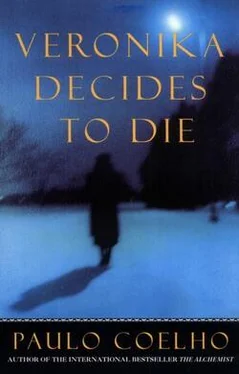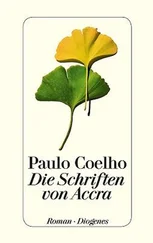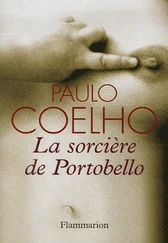“Do you know something else?” said Veronika. “The Virgin never took any notice of what others might think of her. Imagine having to explain to everyone that business about the Holy Ghost. She didn’t explain anything, she just said: ‘That’s what happened.’ And do you know what the others must have said?”
“Of course. That she was insane.”
They both laughed. Veronika raised her glass.
“Congratulations. You should paint those visions of paradise rather than just talking about them.”
“I’ll begin with you,” said Eduard.
Beside the small square there is a small hill. On top of the small hill there is a small castle. Veronika and Eduard trudged up the steep path, cursing and laughing, slipping on the ice, and complaining of exhaustion.
Beside the castle there is a gigantic yellow crane. To anyone coming to Ljubljana for the first time, the crane gives the impression that the castle is being restored and that work will soon be completed. The inhabitants of Ljubljana, however, know that the crane has been there for many years, although no one knows why. Veronika told Eduard that when children in kindergarten are asked to draw the castle of Ljubljana, they always include the crane in the drawing.
“Besides, the crane is much better preserved than the castle.”
Eduard laughed.
“You should be dead by now,” he said, still under the effects of alcohol, but with a flicker of fear in his voice. “Your heart shouldn’t have survived that climb.”
Veronika gave him a long, lingering kiss.
“Look at my face,” she said. “Remember it with the eyes of your soul, so that you can reproduce it one day. If you like that can be your starting point, but you must go back to painting. That is my last request. Do you believe in God?”
“I do.”
“Then you must swear by the God you believe in that you will paint me.”
“I swear.”
“And that after painting me, you will go on painting.”
“I don’t know if I can swear that.”
“You can. And thank you for giving meaning to my life. I came into this world in order to go through everything I’ve gone through: attempted suicide, ruining my heart, meeting you, coming up to this castle, letting you engrave my face on your soul. That is the only reason I came into the world, to make you go back to the path you strayed from. Don’t make me feel my life has been in vain.”
“I don’t know if it’s too early or too late, but, just as you did with me, I want to tell you that I love you. You don’t have to believe it, maybe it’s just foolishness, a fantasy of mine.”
Veronika put her arms around him and asked the God she did not believe in to take her at that very moment.
She closed her eyes and felt him doing the same. And a deep, dreamless sleep came upon her. Death was sweet; it smelled of wine and it stroked her hair.
Eduard felt someone prodding him in the shoulder. When he opened his eyes, day was breaking.
“You can go and shelter in the town hall, if you like,” said the policeman. “You’ll freeze if you stay here.”
In a second Eduard remembered everything that had happened the previous night. There was a woman lying curled in his arms.
“She… she’s dead.”
But the woman moved and opened her eyes.
“What’s going on?” asked Veronika.
“Nothing,” said Eduard, helping her to her feet. “Or rather a miracle happened: another day of life.”
As soon as Dr. Igor went into his consulting room and turned on the light—for daylight still arrived late and winter was dragging on far too long—a nurse knocked at his door.
Things have started early today , he said to himself.
It was going to be a difficult day because of the conversation he would have to have with Veronika. He had been building up to it all week, and had hardly slept a wink the previous night.
“I’ve got some troubling news,” said the nurse. “Two of the inmates have disappeared: the ambassador’s son and the girl with the heart problem.”
“Honestly, you’re a load of incompetents, you are; not that the security in this hospital has ever been up to much.”
“It’s just that no one’s ever tried to escape before,” said the nurse, frightened. “We didn’t know it was possible.”
“Get out of here! Now I’ll have to prepare a report for the owners, notify the police, take steps. Tell everyone I’m not to be disturbed; these things take hours!”
The nurse left, looking pale, knowing that a large part of that major problem would land on his own shoulders, because that is how the powerful deal with the weak. He would doubtless be dismissed before the day was out.
Dr. Igor picked up a pad, put it on the table, and began making notes; then he changed his mind.
He switched off the light and sat in the office precariously lit by the incipient sunlight, and he smiled. It had worked.
In a while he would make the necessary notes, describing the only known cure for Vitriol: an awareness of life. And describing the medication he had used in his first major test on patients: an awareness of death.
Perhaps other forms of medication existed, but Dr. Igor had decided to center his thesis around the one he had had the opportunity to experiment with scientifically, thanks to a young woman who had, quite unwittingly, become part of his fate. She had been in a terrible state when she arrived, suffering from a severe overdose, nearly in a coma. She had hovered between life and death for nearly a week, just the amount of time he needed to come up with a brilliant idea for his experiment.
Everything depended on one thing: the girl’s capacity to survive.
And she had, with no serious consequences, no irreversible health problems; if she looked after herself, she could live as long as or longer than him.
But Dr. Igor was the only one who knew this, just as he knew that failed suicides tend to repeat the attempt sooner or later. Why not use her as a guinea pig, to see if he could eliminate the Vitriol from her organism?
And so Dr. Igor had conceived his plan.
Using a drug known as Fenotal, he had managed to simulate the effects of heart attacks. For a week she had received injections of the drug, and she must have been very frightened, because she had time to think about death and to review her own life. In that way, according to Dr. Igor’s thesis (the final chapter of his work would be entitled “An Awareness of Death Encourages Us to Live More Intensely”) the girl had gone on to eliminate Vitriol completely from her organism, and would quite possibly never repeat her attempt at suicide.
He was supposed to see her today and tell her that, thanks to the injections, he had achieved a total reversal of her heart condition. Veronika’s escape saved him the unpleasant experience of lying to her yet again.
What Dr. Igor had not counted on was the infectious nature of his cure for Vitriol poisoning. A lot of people in Villete had been frightened by their awareness of that slow, irreparable death. They must all have been thinking about what they were missing, forced to reevaluate their own lives.
Mari had come to him asking to be discharged. Other patients were asking for their cases to be reviewed. The position of the ambassador’s son was more worrisome, though, because he had simply disappeared, probably helping Veronika to escape.
Perhaps they’re still together, he thought.
At any rate the ambassador’s son knew where Villete was, if he wanted to come back. Dr. Igor was too excited by the results to pay much attention to minor details.
For a few moments he was assailed by another doubt: Sooner or later Veronika would realize that she wasn’t going to die of a heart attack. She would probably go to a specialist who would tell her that her heart was perfectly normal. She would decide that the doctor who had taken care of her in Villete was a complete incompetent; but then, all those who dare to research into forbidden subjects require both a certain amount of courage and a good dose of incomprehension.
Читать дальше








